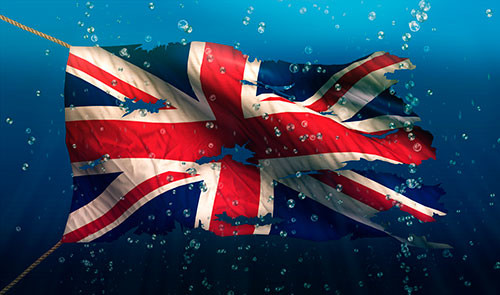
Is the UK now a sinking ship? (Courtesy: iStock/NatanaelGinting)
By Matin Durrani, Editor, Physics World
Amid all the noise and recrimination following the UK’s vote to leave the European Union (EU) in last week’s national referendum by a majority of 52% to 48%, I was reminded of a comment that Nicola Clase – Sweden’s ambassador to Britain – made to Times columnist David Aaronovitch before the referendum. When he sought her views on a potential British exit from the EU (Brexit), Clase replied: “It’s like when a child desperately wants to pee in his pants and does it. At first there’s a feeling of relief and for a few moments it’s nice and warm. Then he’s just cold and wet.”
It was a flippant comment for sure, but not far wide off the mark. As a new week dawns, physicists in the UK – and beyond – are coming to terms with the enormity and liable consequences of the vote. A poll by Nature in March showed that the vast majority of UK scientists were overwhelmingly in support of the EU, with 83% saying “no” to an exit. Although, legally, the outcome of the referendum does not have to be acted upon, we can expect huge and completely unnecessary uncertainty over the next few months, if not longer.
Learned societies in the UK, such as the Institute of Physics, which publishes Physics World, as well as the Royal Society and the Royal Astronomical Society, have been putting a brave face on the prospect of Britain quitting the EU. They underlined the importance of maintaining free movement of scientists to and from the UK, and ensuring British scientists continue to have access to EU research funds and EU-supported facilities. It will be great if those principles and policies remain in place – but there is no guarantee they will. In any case, why should the rest of the EU now want to bother making life easy for the UK as it negotiates a Brexit?
UK scientists have done exceptionally well from EU research programmes. Estimates suggest the UK contributed €5.4bn between 2007 and 2013, but got back €8.8bn. UK scientists won €1.7bn in grants in that time from the EU’s European Research Council – more than any other country. They also snapped up about a quarter (€1.1bn) of all Marie Skłodowska-Curie Actions – awards that help researchers to work in different countries. All that is now in jeapordy. Yes, the UK could still contribute to the EU’s Horizon R&D programme, possibly – like Switzerland, Israel and Norway – as an “associate member”, but that will need complex, costly and time-consuming negotiations.
Long-standing arrangements with, say, the ITER fusion project, of which the EU is a member, will have to be unpicked, renegotiated and reassessed. And if the UK government decides to withdraw from EU R&D programmes entirely, there is no guarantee the money saved would be reinvested in UK science; I can imagine it just disappearing entirely, frittered away on budget shortfalls elsewhere. Scientists from the UK have enjoyed the fruits of EU membership for years, but as a result of the referendum their lives are bound to be made much harder.
And whether intentional or not, the UK’s vote to leave the EU sends out a terrible signal to scientists in the rest of Europe and the wider world. I can quite understand researchers wondering if the UK has pulled up the drawbridge and is no longer a welcoming place for talented scientists to come to these shores. The onus will be on scientists in the UK to underline as strongly as they can that Britain is still an important partner in the European scientific community.
One alarming prospect is the potential of Britain imposing some kind of “points-based” system to stem immigration from the EU, which would be an unnecessary barrier to international scientific collaboration. A talented European physicist with an option of moving to, say, the UK or France may simply decide at a practical level that coming to Britain is not worth the bother. Why jump through those extra hoops?
As my colleague Margaret Harris pointed out a few years ago, under the then-points-based system for non-EU migrants, a young Konstantin Novoselov – who received the 2010 Nobel Prize for Physics for his discovery at the University of Manchester of graphene – would not have qualified as a “highly skilled migrant”.
I sincerely hope that my prognosis is unnecessarily gloomy, but even Peter Higgs at the University of Edinburgh – who is always level-headed and never prone to over-statement – has called Brexit a “disaster”.
The UK has traditionally been an outstanding place for scientists to work, with talented researchers and top universities. I hope that Britain continues to be a place that welcomes scientists from the EU and around the world. Choosing to quit the EU has, however, just made the prospect, in my mind, a whole lot harder.
I for one am unbelievably depressed, and seriously considering moving to a postdoctoral position in any of the world-leading labs in Europe. As they say, “Iesus autem dicebat Pater dimitte illis non enim sciunt quid faciunt dividentes vero vestimenta eius miserunt sortes.”…
I know right? If only I had a pound for every time they say that.
Better convert your pound quickly, Sterling is going down..
Please forgive me for being a bit cruel, cruel because of the cruelty of history: all the nations that built and ran empires for their wealth and glory, in the end, always frittered away into something trivial; here, it seems that GB is going that way quite fast!
Physics is not economics.
Trackback: » The physics of Brexit